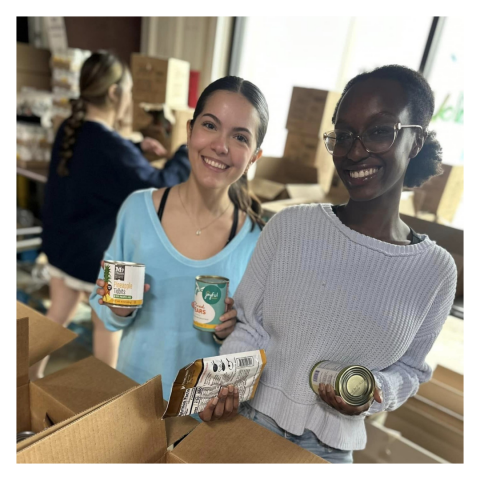
The Problem
Many of our neighbors in need have a hard time reaching food pantries and grocery stores. Some cannot afford a vehicle, gas, and maintenance costs on top of other living expenses.
Lack of access can look like:
- Lack of transportation
- Work during the hours food pantries are open
- Distance to local food pantries
- Disability or mobility issues
According to Feeding America, limited sources of quality food and food assistance are exacerbated by disparities in transportation access.
The Solution
Project GotEM (Going the Extra Mile) is a home delivery service of weekly (bi-weekly or monthly, depending on client needs) boxes that are filled with nutritious, shelf-stable food (approximately 30 lbs.) as well as a bag of seasonal produce. GotEM aims to serve our neighbors in need who lack access to our partner network.

The Impact
Project GotEM (Going the Extra Mile) by the Brazos Valley Food Bank has made a significant impact on the community by addressing food insecurity, especially for those who face barriers to accessing traditional food pantries.
Increased Access to Nutritious Food
Support During Difficult Times
Community Connection
Overall, Project GotEM has been instrumental in ensuring that vulnerable community members have reliable access to nutritious food, thereby enhancing their quality of life and fostering a stronger, more supportive community.
![]()
For the 2023-2024 year, Project GotEm served 687 individuals with the distribution of 11,122 boxes of food.
Want to dive deeper into BVFB's Project GotEM?
Learn more about the ins-and-outs at the links below!

Project GotEM (Going the Extra Mile) by the Brazos Valley Food Bank was created to address the significant barriers some community members face in accessing food.
The program was developed in response to the recognition that many individuals in the Brazos Valley area struggled to reach food pantries due to transportation issues, work schedules, distance, and mobility challenges
Project GotEM was launched to provide a home delivery service, ensuring that those who couldn't access traditional food distribution points still received nutritious food. The service includes delivering boxes of shelf-stable food and seasonal produce directly to clients' homes
Since its inception, Project GotEM has grown significantly, helping numerous individuals and families in the community. The program has been particularly beneficial for those with disabilities, the elderly, and others who face significant barriers to food access
Due to its success and high demand, Project GotEM is currently at maximum capacity, and the waitlist for the service is also closed. This underscores the critical need for such initiatives in the community.
The program has made a substantial impact by ensuring that vulnerable community members have reliable access to nutritious food, thereby improving their quality of life and fostering a stronger, more supportive community.
Access to Grocery Stores: Many people without reliable transportation struggle to reach grocery stores that offer fresh and healthy food options. This often forces them to rely on convenience stores or fast food, which typically offer less nutritious choices
Cost of Transportation: For those who do have access to transportation, the cost can be prohibitive. Limited budgets mean that spending money on gas, public transit, or ride-sharing services can take away from funds available for purchasing food
Physical Limitations: Individuals with mobility issues, such as those who are elderly or have disabilities, may find it challenging to travel to grocery stores or food pantries. This can lead to increased reliance on others for food access or going without necessary food items
Impact on Health: Food insecurity is often linked with chronic health conditions. Those with limited mobility or transportation options may find it even harder to manage their health, as they cannot easily access nutritious food that supports their medical needs
Social Networks: People without transportation often depend on friends or family for rides to grocery stores. This reliance can be unreliable and inconsistent, further exacerbating food insecurity
